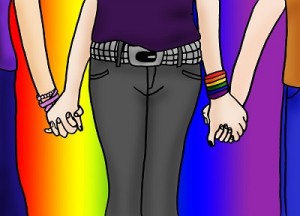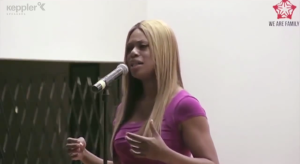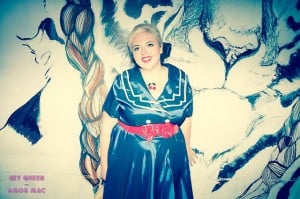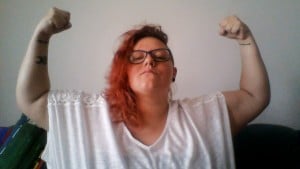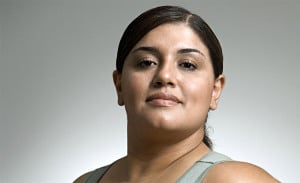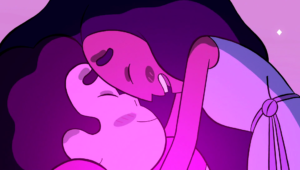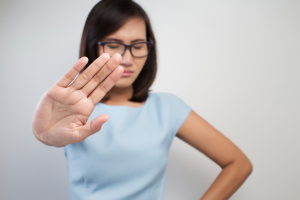(Content Warning: Sexual Violence)
I am a feminist.
Obviously. I write for an online magazine called Everyday Feminism.
And I’m the kind of feminist that can’t stop pointing out everything that’s problematic.
I’m the “I refuse to watch this movie” or “I can’t listen to this song” feminist.
I’ve put feminist in bold, angry letters on dating profiles to weed out the misogynists and the faint of heart.
I’m Your Friendly Neighborhood Feminist™ that my friends seek when they want to know more about a specific issue – and I’m pretty sure my friends can now use the word heteronoromativity in a sentence because of me.
I wholeheartedly embrace the label of feminist. I do not shy away from the word or most things associated with it.
But for some of us, mainstream feminism by itself is not enough.
Why My Blackness and Feminism Are Bound
I am a black feminist.
The intersections of my race and gender are very important to my method of theory and practice within community service, which I’m very passionate about.
To me, being black and being a woman are not identities that I can separate. I don’t wake up in the morning and decide which identity I’ll flaunt today.
Not being able to abstract my womanhood and blackness is an obstacle I’ve encountered in my mainstream feminist circles that are mostly concerned with gender and sex.
Yes, we’ve all agreed that women are discriminated against on the basis on gender. All genders should be equal, obviously. But equality looks very different because the category “woman” is not a homogenous one.
What about black women? Indigenous women? Trans women? Disabled women? Fat women?
Though mainstream feminism has become more inclusive and intersectional with each wave, there is still some resistance to embrace the varying values and needs of the numerous groups and identities feminism is supposed to advocate for.
In fact, at times it seems like mainstream feminists want to operate under the same systems of oppressions instead of dismantling them.
Rather than rejecting the privileges many feminist receive as white, cisgender, non-disabled women, they perpetually attempt to assimilate the rest of us up to some capitalistic, imperialist standard of whiteness.
And that’s frustrating for a lot of black women.
We’re expected to care for everyone else. We’ve been told time and again since the beginning of the suffrage movement that our rights have to wait. That our humanity has to wait. That we are last.
And so I get it when women, especially black women, reject the feminist label. Feminism hasn’t been too friendly to us.
These oppressive and exclusive goals of mainstream feminist movements leave the rest of us behind.
1. Wage Equality and Equal Opportunity Employment
Let’s keep it real: Mainstream feminism is absolutely not advocating for women of color in the fight for wage equality and equal employment opportunities.
For example, I still have to write that I’m “JM” on resumes and not “Jenika” just to increase the chances of me even getting a call back.
Then, let’s imagine that I do get a call back, and even better (or rarer), I get the job.
As a Black woman, I make 64 cents to every dollar a white man makes. Native American women make 60 cents and my Latina/Chicana sisters make 53 cents. Trans women face major discrimination and a decrease in wages once they transition.
So why on earth are feminist still insisting that women make 77 cents to a man’s dollar? Do we not exist or is it only the plight of white women that count in mainstream feminism?
And what about men of color?!
They don’t make 77 cents to the white man’s dollar. They’re too busy catching felony drug charges and spending a ludicrous amount of time in prison, and afterwards being further shut out society because felons can’t vote and are obligated to check that discriminatory box on resumes.
Equal Opportunity Employer, my ass. But seventy-seven cents, y’all! Seventy-seven cents.
The wage equality debate is a prime example of how mainstream feminism excludes everyone who isn’t heterosexual and white.
What happens when white women get that whole dollar? Will they continue to fight for the rest of us?
It’s painfully evident that within mainstream feminism, the goal is to be equal to our oppressors rather than ridding the society of oppression.
And that will leave a lot of people behind.
2. Reproductive Justice
While reproductive justice is a universal issue, within mainstream feminism, it’s narrowed down and packaged as an issue that only affects middle class cisgender women between the ages of 18-30.
We tell male legislators to stay the hell out of our vaginas but a) we ignore that some men, gender queer, agender, and gender non-binary people have vaginas, and that b) the lack of reproductive rights disproportionately affects the working class and people who already have children.
Reproductive justice is often seen as the right to not have children, so there is also little to no discussion about indigenous women being sterilized against their will, or how childcare services are constantly cut, or how Black children have to contend with the school to prison pipeline.
But you know, our problematic fave Margaret Sanger, founder of Planned Parenthood, was kind of a racist, pro-eugenics jerk who thought “women of the working class, especially wage workers, should not have more than two children at most, ” and, by ignoring all the racialized nuances of reproductive justice, it seems like mainstream feminism somewhat aligns with her ideology.
I guess her solution to poverty wasn’t to demand that all employers pay an equitable and justice oriented living wage to all workers, but that, instead, we should oppress the poor and working class even more by attempting to control their family size.
Again, we can see that mainstream feminism has a narrow scope of who is worth championing for.
3. Sexual Aggression
The whole discourse surrounding sexual aggression (which encompasses violent and/or intimidating behavior from street harassment to rape) is limiting.
Because the “ideal victim” in the media is seen as white, women of color hardly report their abuse. And if they do, they aren’t believed, or it is insinuated that they deserved it.
And again, when it comes to the issue of catcalling, normative women’s voices drown out everyone else’s on the issue.
A fat woman, a disabled woman, a trans woman, or any other woman that deviates from the “norm” has an entirely different set of “compliments” hurled at her while walking down the street – but since mainstream feminism still doesn’t understand what intersectionality is, let alone how to actually apply it, these issues are ignored.
Mainstream feminism has a few things to work out before it is truly intersectional and inclusive, because too many people are still not being heard.
So What Movement Are Black Women Joining When Mainstream Feminism Fails Us?
So, you might be asking yourself: Where do black women go instead?
Where are we truly at home in our black womanhood and our diverse and multifaceted humanity? What do we do when feminism refuses to encompass all that we are?
Fortunately, we aren’t limited to just one label. Much like how I can’t divorce my black, cis woman, and heterosexual identities, some labels seeking equality are either interchangeable or work together to fill each other’s gaps.
One movement that is complimentary with feminism is womanism.
If black women are unable to find safer space within mainstream feminism, womanism is an amazing alternative.
The term womanism was coined by the illustrious Alice Walker (author of one of my favorite books The Color Purple) as a way to prioritize black womens’ experiences when developing a framework for theory and activism.
It is an opportunity to define ourselves, and not be defined by the experiences of white feminists (mostly as an afterthought, anyway).
Womanism gives us the opportunity to be the center of discourse and have scholars and activists mobilize around our own unique experiences.
Womanism is revolutionary: In a society where black women’s livelihoods are under constant attack and scrutiny and where black men take precedence in black social movements, a movement that’s all about us is necessary.
It’s radical to care for ourselves in a world that continues to beat us down.
It is a space where we can acknowledge and organize around the fact that black women face police brutality too, that black girls are suspended from school at much higher rates than black boys and white girls, that 10.6% of black women over the age of 20 are unemployed.
Black women are unsupported and drowning, and womanism is a safe haven.
And that’s the thing: Womanism is just for black women.
So it’s not really anyone else’s place to go around calling themselves that, because Walker coined the term to fill a need that mainstream feminism created by shutting black women out, and failing to acknowledge how the intersections of race, class, sexual orientation, and gender stratified women’s experiences, and often had black women at the bottom of the race/gender hierarchy.
It’s also fairly known that mainstream white feminism marginalizes all people of color, but let’s not pretend that other people of color don’t also exhibit anti-blackness.
Womanism makes black women’s experiences a priority.
And Some of Us Choose to Embrace Both!
Womanism is necessary and important because it engages the intersections of race and gender more than current mainstream feminism, which you already know means a great deal to me.
You might be thinking, “Wow, Jenika! Womanism sounds awesome – why don’t you identify as one? Why are you so attached to feminism?”
And I can honestly tell you that from the time of my first Women’s Studies class when at age 19 and my first protest at 21, that feminism and all it stands for has always felt like home to me.
But that surely doesn’t mean that my feminism isn’t womanist.
That’s really important to point out: You can use multiple ideologies at once or claim more than one label to create an identity that is entirely your own.
Feminism and womanism have similar end goals: eradicating the systematic oppressions of various identities to achieve true equality.
But systematic oppression looks different to everyone, which is why womanism is necessary. Equality is not a one size fit all thing.
While I have my issues with feminism, I still wear the label proudly. There are many, many days where I can’t defend feminism, but I stand by it.
Why?
Because I refuse to be shut out of mainstream (white) feminism. Black women helped build this movement.
This is what a feminist looks like, and you better get used to it.
My feminism is black, intersectional, and womanist. These identities are so intertwined in each other that they cannot exist on their own.
I’ll be that person championing for the rights for black women, trans women, disabled women, and all women. I’ll fight for all people daring to survive within institutions of inequality designed to see them fail.
My experiences and knowledge as a black woman should be a part of mainstream feminist discourse, too. I want to change the way people view feminists, and I want to be seen and acknowledged and supported in the larger movement.
Black women deserve that much.
Black women before me have put too much time and effort into just being acknowledged in the feminist movement to just give up on it. We helped build this. Feminism is not perfect, but it is home to me.
And it may not be home to everyone, which is understandable. Be a feminist, a womanist, a humanist, or nothing at all. Be whatever you want to be, just don’t let any one or any movement tell you that your experiences don’t matter.
As for me, I am a feminist, I am a black feminist, and I’m here to stay.
[do_widget id=”text-101″]
Jenika McCrayer is a Contributing Writer for Everyday Feminism. A Virginia native with a BA in Women and Gender Studies from The College of William and Mary, she is currently pursuing an MA in the same field. Jenika also enjoys good books, bad horror films, naps, and the beach. Follow her on Twitter @JenikaMc. Read her articles here.
Search our 3000+ articles!
Read our articles about:
Our online racial justice training
Used by hundreds of universities, non-profits, and businesses.
Click to learn more
Most Read Articles
- « Previous
- 1
- …
- 30
- 31
- 32






